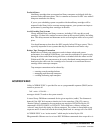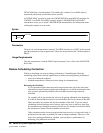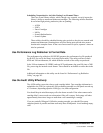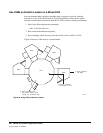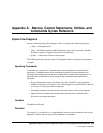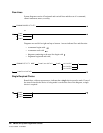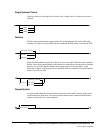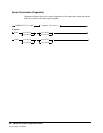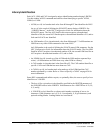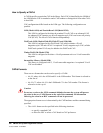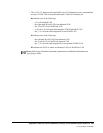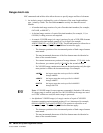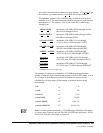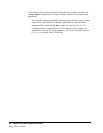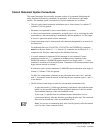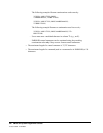
Appendix A. Macros, Control Statements, Utilities, and Commands Syntax Reference 433
1st ed., 6/30/04 - 312579601
Library Identification
Each ACS, LSM, and CAP is assigned a unique identification number during LIBGEN.
Use this number in HSC commands and utilities when identifying a specific ACSid,
LSMid, or CAPid.
•ACSid (acs-id) is a hexadecimal value from 00 through FF that identifies the LMU.
An acs-id is the result of defining the SLIALIST macro during a LIBGEN. See
‘‘LIBGEN Macros’’ in the HSC Configuration Guide for information about the
SLIALIST macro. The first ACS listed in this macro acquires a hexadecimal
identifier of 00, the second ACS listed acquires a hexadecimal identifier of 01, and so
forth until all ACSs are identified.
• An LSM number (ll) is a hexadecimal value from 00 through 17. It differentiates an
LSM from every other LSM connected to the same LMU.
An LSM number is the result of defining the SLIACS macro LSM parameter. See the
HSC Configuration Guide for information about the SLIACS macro. The first LSM
listed for an ACS acquires a hexadecimal number of 00, the second LSM listed for an
ACS acquires a hexadecimal number of 01, and so forth.
• An LSMid (lsm-id) is made up of the ACSid and the LSM number separated by a
colon (:). It differentiates an LSM from every other LSM in a library.
• A CAP number is a hexadecimal value from 00 to 02. The CAP number identifies a
specific CAP in an LSM that has more than one CAP.
•A CAPid (cap-id) is a hexadecimal value made up of the LSMid and the CAP
number separated by a colon. Refer to “How to Specify a CAPid” on page 434 for
more information.
Some HSC commands and utilities require, or optionally allow, the user to specify a host
identifier or a VOLSER.
•The host-id for a given host is the identifier specified in the HOSTID parameter of
the SLILIBRY macro in the LIBGEN. Valid characters for a HOSTID are A-Z, 0-9,
#, $, and @.
• A VOLSER (volser) identifies a volume serial number consisting of one to six
characters. Valid characters are A-Z, 0-9, # (crosshatch), $, ¥ (yen character), and
optional trailing blanks. Leading blanks are not allowed.



